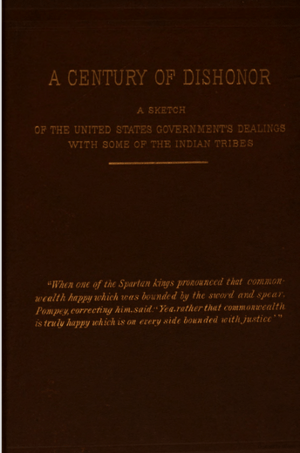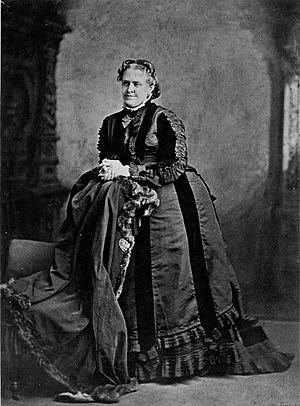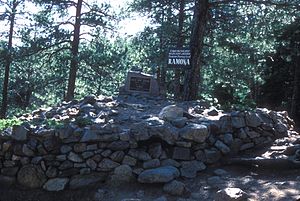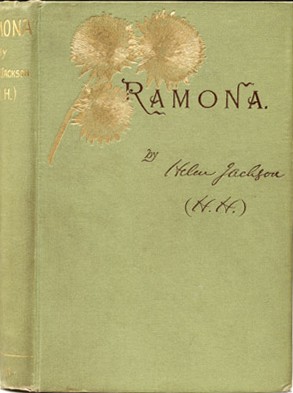Helen Hunt Jackson facts for kids
Quick facts for kids
Helen Hunt Jackson
|
|
|---|---|
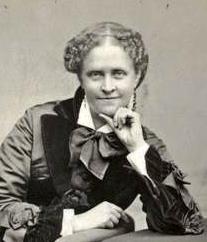 |
|
| Born | Helen Maria Fiske October 15, 1830 Amherst, Massachusetts, U.S. |
| Died | August 12, 1885 (aged 54) San Francisco, California, U.S. |
| Resting place | Evergreen Cemetery, Colorado Springs, Colorado, U.S. |
| Pen name | H.H. |
| Occupation | Poet, writer |
| Language | English |
| Alma mater | Ipswich Female Seminary; Abbott Institute |
| Notable works | A Century of Dishonor (1881); Ramona (1884) |
| Spouse |
Edward Bissell Hunt
(m. 1852)William Sharpless Jackson
(m. 1875) |
Helen Hunt Jackson (who also wrote as H.H.) was an American poet and writer. Born Helen Maria Fiske on October 15, 1830, she became a strong voice for better treatment of Native Americans by the United States government.
She wrote a history book called A Century of Dishonor (1881). This book showed how the government's actions had harmed Native Americans. Her novel Ramona (1884) told a story about the unfair treatment of Native Americans in Southern California after the Mexican–American War. This novel became very popular and helped bring attention to her important cause. Many people loved its romantic story, and it even made Southern California a popular place for tourists.
Contents
Early Life and School
Helen Maria Fiske was born in Amherst, Massachusetts. Her father, Nathan Welby Fiske, was a minister and a professor at Amherst College. Helen had a sister named Anne. Sadly, her two brothers died very young.
Helen's mother passed away in 1844 when Helen was fourteen years old. Three years later, her father also died. He made sure Helen would have money for her education and arranged for her uncle to care for her. Helen went to Ipswich Female Seminary and the Abbott Institute, a boarding school in New York City. She was a classmate of the famous poet Emily Dickinson, and they wrote letters to each other throughout their lives.
Becoming a Writer
Marriage and Early Career
In 1852, when she was 22, Helen married Edward Bissell Hunt, a U.S. Army Captain. They had two sons, but both died young. Her first son, Murray, died as a baby in 1854. Her husband, Edward, died in 1863 in an accident. Her second son, Warren, died at age 9 in 1865 from a serious illness.
These sad losses deeply affected Helen and inspired some of her early poems. She began her serious writing career in 1866. Her first successful poem, "Coronation," was published in The Atlantic magazine. She continued to write for many well-known magazines. In 1872, she visited California for the first time.
In 1875, Helen married William Sharpless Jackson, a wealthy banker, in Colorado Springs, Colorado. She then became known as Helen Hunt Jackson. She first published her work without her name, often using the pen name "H.H." The famous writer Ralph Waldo Emerson admired her poetry and included some of her poems in his book Parnassus: An Anthology of Poetry (1880).
Fighting for Native Americans
In 1879, Helen Hunt Jackson became very interested in the rights of Native Americans. This happened after she heard a talk in Boston by Chief Standing Bear of the Ponca Tribe. Chief Standing Bear spoke about how his tribe was forced to leave their land and suffered greatly.
Helen was very upset by this unfair treatment. She became an activist, which means she worked hard to bring about change. She began to investigate and share stories of government wrongdoing. She collected signatures for petitions, raised money, and wrote letters to The New York Times to help the Ponca people.
Helen was a passionate writer and often argued with government officials about the unfairness toward Native American tribes. She pointed out how the government broke promises and treaties. She also showed how some U.S. Indian agents, military officers, and settlers were corrupt, taking land from Native Americans.
Many newspaper editors supported her and published her reports, helping her spread her message.
A Century of Dishonor
In 1879, after hearing Chief Standing Bear's lecture, Jackson wrote a book. This was the first book published under her own name. In it, she strongly criticized the government's policies toward Native Americans. She wrote about a long history of broken treaties.
Her book, A Century of Dishonor (1881), called for big changes in how the government treated Native Americans. She sent a copy of the book to every member of Congress. On the cover, she printed a quote from Benjamin Franklin: "Look upon your hands: they are stained with the blood of your relations."
Helping the Mission Indians
Helen Hunt Jackson later traveled to Southern California. She became very interested in the Mission Indians there. She learned about their difficult situation after the Mexican government's policies in 1833 and later U.S. policies, which caused them to lose their lands. In 1852, about 15,000 Mission Indians lived in Southern California. By the time Helen visited, there were fewer than 4,000.
Inspired by their stories, Helen decided to act. The U.S. Commissioner of Indian Affairs asked her to become an agent for the Interior Department. Her job was to visit the Mission Indians, find out where they lived, how they were doing, and what land might be bought for them. She traveled all over Southern California, documenting the conditions. She even hired lawyers to help a family of Saboba Indians who were about to lose their land.
In 1883, Helen finished her report. It suggested that the government should provide a lot of help for the Mission Indians. This included buying new lands for them to live on and creating more schools for Native American children. A bill with her ideas passed in the U.S. Senate but did not pass in the House of Representatives.
Helen then decided to write a novel to reach even more people. She hoped her story would touch people's hearts. She was inspired by her friend Harriet Beecher Stowe's book Uncle Tom's Cabin, which helped change views on slavery. Helen hoped her book could do something similar for Native Americans.
Later Writing and Ramona
Helen started writing her novel in December 1883 and finished it in about three months. It was published as Ramona (1884). The story was about Ramona, an orphan girl who was part Native American and part Scottish. It followed her and her Native American husband, Alessandro, as they struggled to find their own land. The characters and events in the book were based on real people and situations Helen had learned about.
The book quickly became very popular. Its romantic story encouraged many people to visit Southern California to see the places described in the novel.
One of Helen's most famous poems is Cheyenne Mountain, about a mountain in Colorado Springs. She was friends with another writer, Flora Haines Loughead, who cared for her during her final illness.
Helen planned to write a children's story about Native American issues, but she passed away before she could finish it. Her last letter was sent to President Grover Cleveland. In it, she thanked him for what he had already done for Native Americans and asked him to read her book A Century of Dishonor. She wrote that she was dying happier, believing that he would help fix the wrongs done to the Native American people.
Death and Burial
Helen Hunt Jackson died in 1885 in San Francisco from stomach cancer. Her husband arranged for her to be buried near Seven Falls in Colorado Springs. Later, her remains were moved to Evergreen Cemetery in Colorado Springs.
Legacy and Honors
Helen Hunt Jackson's work left a lasting impact.
- The largest collection of her writings is kept at Colorado College.
- The Helen Hunt Jackson Branch of the Los Angeles Public Library is a beautiful building named after her.
- A part of her home in Colorado has been rebuilt in the Colorado Springs Pioneers Museum.
- In Hemet, California, an outdoor play called the Ramona Pageant is performed every year, based on her novel.
- Several schools in California and Colorado are named after her or her character Ramona.
- Helen Hunt Falls, a waterfall in Colorado Springs, is named in her memory.
- She was recognized in the Colorado Women's Hall of Fame in 1985.
Selected Works
- Bits of Travel (1873)
- Bits about Home Matters (1873)
- Saxe Holm's Stories (1874)
- The Story of Boon (1874)
- Mercy Philbrick's Choice (1876)
- Hetty's Strange History (1877)
- Bits of Talk in Verse and Prose for Young Folks (1876)
- Bits of Travel at Home (1878)
- Nelly's Silver Mine: A Story of Colorado Life (1878)
- Letters from a Cat (1879)
- A Century of Dishonor (1881)
- Ramona (1884)
- Zeph: A Posthumous Story (1885)
- Glimpses of Three Coasts (1886)
- Between Whiles (1888)
- A Calendar of Sonnets (1891)
- Ryan Thomas (1892)
- The Hunter Cats of Connorloa (1894)
- Poems by Helen Jackson Roberts Bros, Boston (1893)
- Pansy Billings and Popsy: Two Stories of Girl Life (1898)
- Glimpses of California (1914)
See also
 In Spanish: Helen Hunt Jackson para niños
In Spanish: Helen Hunt Jackson para niños
 | Jackie Robinson |
 | Jack Johnson |
 | Althea Gibson |
 | Arthur Ashe |
 | Muhammad Ali |


